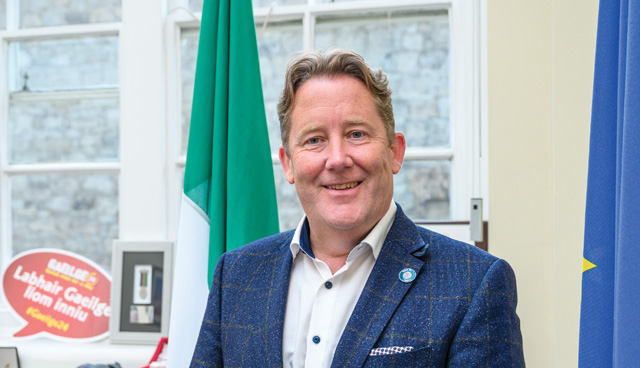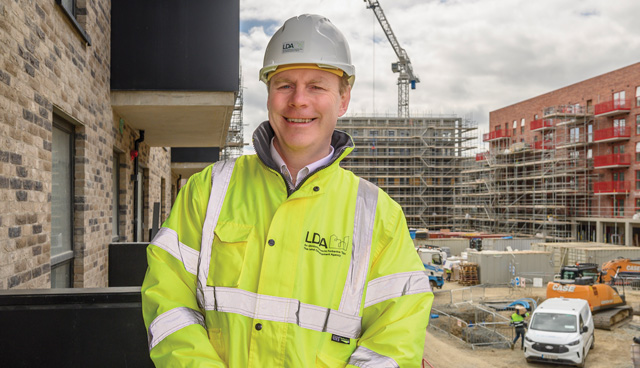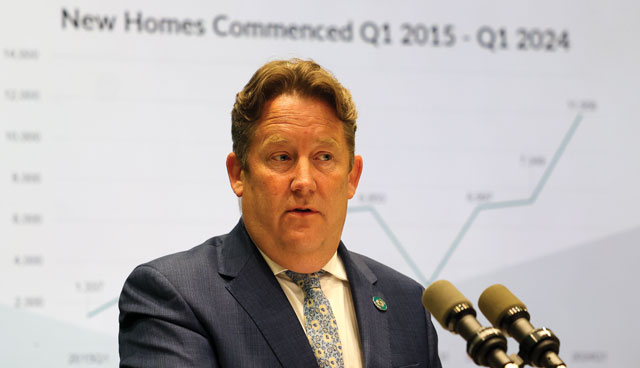
Build 2024: ‘Reason to be positive’ on construction progress
3rd July 2024
Grant’s integrated heating solutions delivering efficiency to residential projects throughout Ireland
3rd July 2024Climate Action Plan 2024 and housing

Under Climate Action Plan 2024 (CAP24), the Government is targeting a 40 per cent reduction in residential buildings emissions through retrofitting, district heating, and heat pumps.
Published in December 2023, the forth iteration of the Climate Action Plan (CAP) reiterates government’s target for 500,000 homes to be retrofitted to a B2 Building Energy Rating (BER) by 2030. To attain the target, CAP24 reemphasises the importance of the National Retrofit Plan, which aims make “retrofitting more affordable and easier to access”.
Furthermore, CAP24 states that the continued rollout of the Social Housing National Retrofitting Programme will increase funding to help low-income households upgrade their homes.
The target of 680,000 heat pumps installed by 2030 is also restated within CAP24, with the support to roll-out 215,000 heat pumps in homes by 2025. This target includes both new and existing housing. Additionally, CAP24 aims to ensure new dwellings are designed and constructed to nearly zero energy building (NZEB) standard by 2025, and Zero Emission Building standard by 2030. Currently, NZEB/retrofit centres of excellence are training new entrants into the construction sector, who, CAP24 states, will be “invaluable in retrofitting our building stock”.
Furthermore, a target of 0.8TWh of district heating is set to be developed across both the residential and commercial building stock by 2025, and up to 2.7 TWh by 2030. This includes the Tallaght District Heating Network which utilises excess heat from a nearby data centre to heat 32,800m2 of buildings. CAP24 also provides a target of up to 0.6 TWh of heating to be provided by biomethane by 2025, and up to 1.1 TWh by 2030.
Additionally, CAP24 highlights that regarding trends in the sector, the built environment sector accounted for 11.1 per cent of Ireland’s greenhouse gases in 2022, down from 12.3 per cent in 2021. Within the residential sector, the emissions ceiling set out in CAP24 is 29 MtCO2eq. for 2021-2025, and 23 MtCO2eq. for 2026-2030.
Innovative construction techniquesTurning to the adoption of modern methods of construction (MMC), CAP24 states it “has the potential to dramatically improve [construction] sector productivity, innovation, speed of delivery, sustainability and ultimately, costs”. The National Construction Training Centre and demonstration park in Mount Lucas, County Offaly, established under Housing for All, aims to act as “an accessible and interactive location for applied research, training and demonstration, reflecting the current and future needs of the housing sector”. The training and reskilling will include: • informing and supporting innovation within the built environment through the introduction of modern methods of construction methodologies and techniques; • creating innovative education and demonstration facilities that include live testing (research) and training (skills development); and • promoting sustainability and the circular economy in the built environment. |
Addressing vacant propertiesIn January 2023, the Department of Housing, Local Government and Heritage (DHLGH) launched a new €150 million scheme from the Urban Regeneration and Development Fund for vacancy projects as part of the Vacant Homes Action Plan. This fund is available to local authorities to acquire vacant or derelict properties or sites to make them more attractive for re-use or re-sale, aiming to incorporate activation of vacant properties in the Urban Regeneration and Development Fund. Regarding residential standards and regulations, the DHLGH, in conjunction with SEAI, is working with professional bodies to progress professional development modules on the retrofit of traditional buildings for delivery to construction professionals. CAP24 states that Housing for All commits the Government to acting in this area and a report on regional demographics and structural housing demand at county level will be produced by the ESRI in 2024. The findings within this report will be addressed within future climate action plans. |
Policy initiatives and developmentsThe plan highlights that addressing energy poverty is at the heart of a ‘just transition’, and is the guiding principle of the Energy Poverty Action Plan. ESRI research has found that targeted supports for low-income households can address energy poverty. In relation to just transition, the action plan states that government policy has resulted in the equitable redistribution of carbon tax revenue to support a socially progressive residential retrofit programme. In 2023, over half of the Government’s total annual retrofit budget is ring-fenced through the Warmer Homes Scheme and the Social Housing Energy Efficiency Retrofit Programme. A working group led by the Department of Transport and DHLGH is also identifying transport orientated development opportunities in major urban centres, as identified in Housing for All. In July 2023, the Department of the Environment, Climate and Communications, presented Ireland’s second Voluntary National Review (VNR), entitled Building Back Better, which outlines progress Ireland is making in achieving the UN Sustainable Development Goals. |
HeatRegarding heat, the Heat and Built Environment Delivery Taskforce was established in 2023 to oversee and support outputs and projects in relation to retrofitting, renewable heat, district heat, decarbonisation and energy use of the building stock, and industrial heat. The taskforce, over the course of 2024, aims to continue to focus on the acceleration of system-wide project and programme delivery, with high level actions to be taken set out in each Climate Action Plan going forward. To achieve heat targets, CAP24 states that the publication of a National Heat Policy Statement in 2024 will draw on the evidence of the National Heat Study. The Policy Statement will also aim to guide the Government’s overall response to the National Heat Study across all sectors and will be underpinned by the Renewable Heat Obligation. |
VisionThe Minister of the Environment, Climate and Communications, Eamon Ryan TD stated during the publication of the CAP24: “Our buildings’ emissions target is on track, showing an 8 per cent decrease this year [2024], driven largely by greater energy efficiencies, a progressive new homes policy which is effectively eliminating fossil fuels from our new stock, and the retrofitting success. “This year, we will support over 46,000 homes to be warmer and cheaper to run, smashing our target of 37,000 for the year.” |






